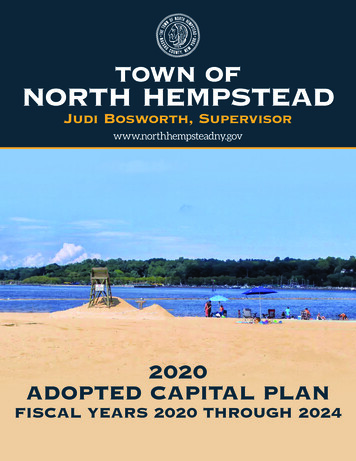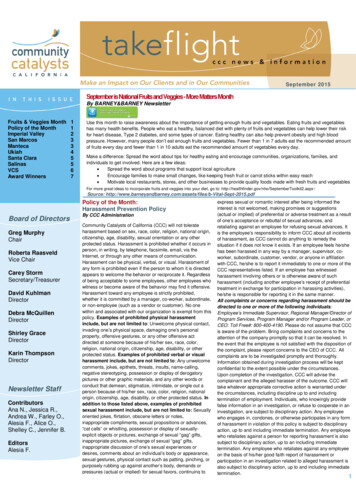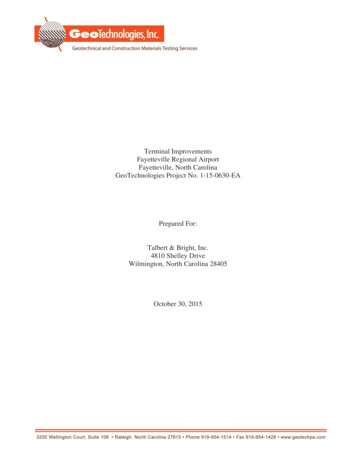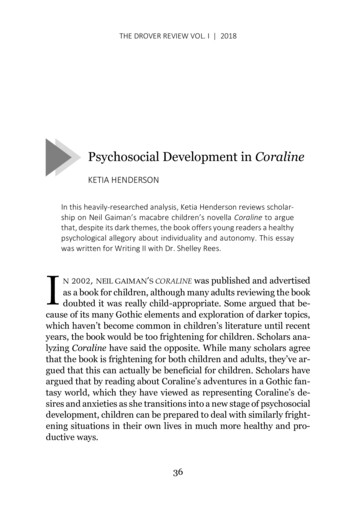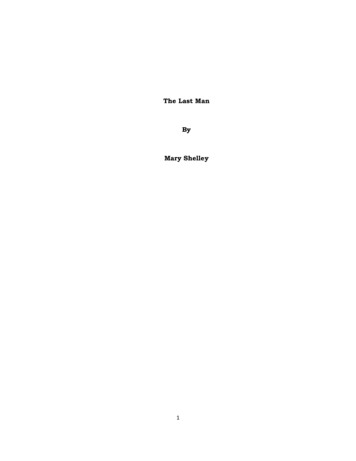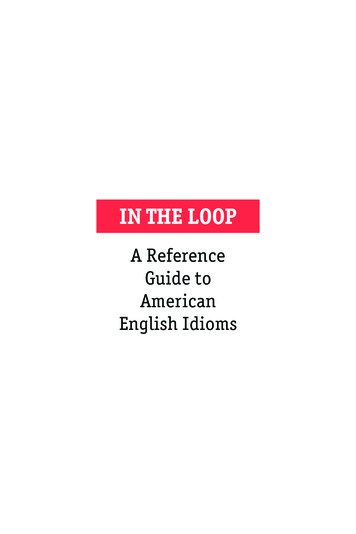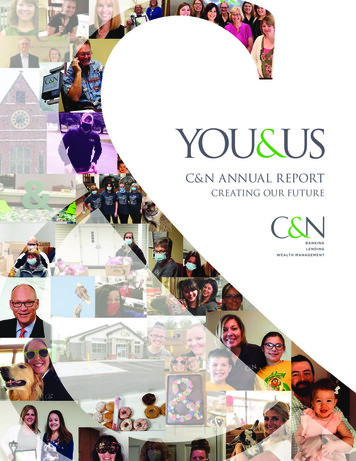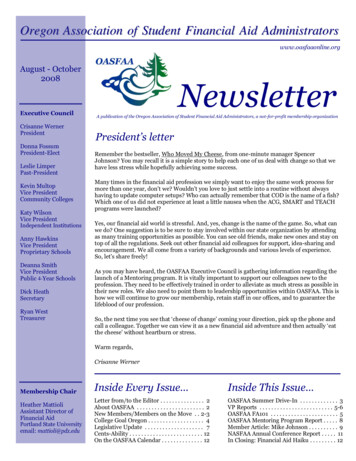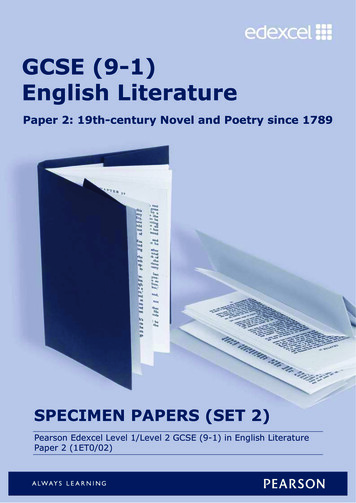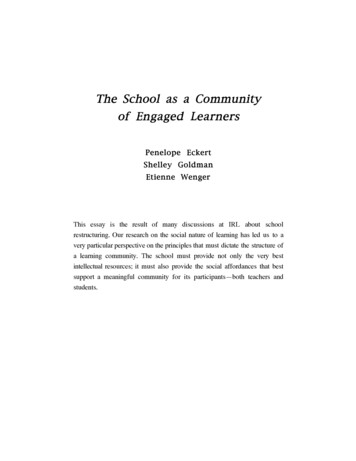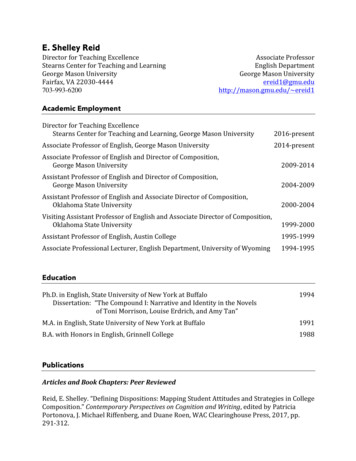
Transcription
E. Shelley ReidDirector for Teaching ExcellenceStearns Center for Teaching and LearningGeorge Mason UniversityFairfax, VA 22030-4444703-993-6200Associate ProfessorEnglish DepartmentGeorge Mason Universityereid1@gmu.eduhttp://mason.gmu.edu/ ereid1Academic EmploymentDirector for Teaching ExcellenceStearns Center for Teaching and Learning, George Mason University2016-presentAssociate Professor of English, George Mason University2014-presentAssociate Professor of English and Director of Composition,George Mason University2009-2014Assistant Professor of English and Director of Composition,George Mason University2004-2009Assistant Professor of English and Associate Director of Composition,Oklahoma State University2000-2004Visiting Assistant Professor of English and Associate Director of Composition,Oklahoma State University1999-2000Assistant Professor of English, Austin College1995-1999Associate Professional Lecturer, English Department, University of Wyoming1994-1995EducationPh.D. in English, State University of New York at BuffaloDissertation: “The Compound I: Narrative and Identity in the Novelsof Toni Morrison, Louise Erdrich, and Amy Tan”1994M.A. in English, State University of New York at Buffalo1991B.A. with Honors in English, Grinnell College1988PublicationsArticles and Book Chapters: Peer ReviewedReid, E. Shelley. “Defining Dispositions: Mapping Student Attitudes and Strategies in CollegeComposition.” Contemporary Perspectives on Cognition and Writing, edited by PatriciaPortonova, J. Michael Riffenberg, and Duane Roen, WAC Clearinghouse Press, 2017, pp.291-312.
Reid, p. 2Reid, E. Shelley. “On Learning to Teach: Letter to a New TA.” WPA: Writing ProgramAdministration 40.2 (Spring 2017): 129-145.Reid, E. Shelley. “Peer Review for Peer Review’s Sake: Resituating Peer Review Pedagogy.”Peer Pressure, Peer Power: Collaborative Peer Review and Response for the WritingClassroom. Ed. Steven J. Corbett, Michelle LaFrance, and Teagan Decker. Southlake, TX:Fountainhead Press, 2014. 217-231.Reid, E. Shelley, Heidi Estrem, and Marcia Belchier.“The Effects of Writing PedagogyEducation on Graduate Teaching Assistants’ Approaches to Teaching Composition.” WPA:Writing Program Administration 36.1 (Fall 2012): 32-73.Winner, the Kenneth Bruffee Award for Best Article in WPA: Writing ProgramAdministration, 2012-2013.Estrem, Heidi, and E. Shelley Reid. “What New Writing Teachers Talk About When TheyTalk About Teaching.” Pedagogy 12.3 (Fall 2012): 447-478.Selected for and reprinted in The Best of the Independent Rhetoric and CompositionJournals 2013. Ed. Steve Parks et al. Lafayette, IN: Parlor Press, 2015. 292-329.Reid, E. Shelley. “Ten Ways To Think About Writing: Metaphoric Musings for CollegeWriting Students.” Writing Spaces: Readings on Writing, Volume 2. Ed. Charlie Lowe andPavel Zemliansky. West Lafayette, IN: Parlor Press, 2010. 3-23. http://writingspaces.org/volume2 Reid, E. Shelley. “Managed Care: All-Terrain Mentoring and the ‘Good Enough’ FeministWPA.” Performing Feminist Administration in Rhetoric and Composition Studies. Ed. RebeccaRickly and Krista Ratcliffe. Cresskill, NJ: Hampton Press, 2010. 128-141.Zawacki, Terry, E. Shelley Reid, Ying Zhou, and Sarah Baker. “Voices at the Table: Balancingthe Needs and Wants of Program Stakeholders to Design a Value-added WritingAssessment Plan.” Across the Disciplines 6 (2010): n. tal.cfmReid, E. Shelley. “Teaching Writing Teachers Writing: Difficulty, Exploration, andReflection.” College Composition and Communication 61.2 (December 2009): 376 [W197W221].Reid, E. Shelley. “Mentoring Peer Mentors: Program Design and Mentor Education in theComposition Program.” Composition Studies 36.2 (Fall 2008): 51-80.Reid, E. Shelley. “Will Administrate for Tenure.” The Promise and Perils of Writing ProgramAdministration. Ed. Theresa Enos and Shane Borrowman. West Lafayette, IN: Parlor Press,2008. 203-211.
Reid, p. 3Baker, Anthony, Karen Bishop, Suellynn Duffey, Jean Gunner, Rich Miller, and E. ShelleyReid. “The Progress of Generations.” WPA: Writing Program Administration 29.1/2 (Fall2005): 31-58.Reid, E. Shelley. “Uncoverage in Composition Pedagogy.” Composition Studies 32.1 (2004):15-34.Reid, E. Shelley. “Starting Somewhere Better: Revisiting Multiculturalism in First-YearComposition.” Pedagogy 4.1 (2004): 65-92.Reid, E. Shelley. “A Changing for the Better: Curriculum Revision as a Means to ReflectivePractice in Teaching and Administration.” WPA: Writing Program Administration 36.3(2003): 10-27.Reid, E. Shelley. “Beyond Morrison and Walker: Looking Good and Looking Forward inContemporary Black Women’s Stories.” African American Review 34.2 (2000): 313-328.Reprinted: “Beyond Morrison and Walker: Looking Good and Looking Forward inContemporary Black Women’s Stories.” African American Writing vol. 4. Ed. A. RobertLee. London: Routledge, 2012.Reprinted: “Beyond Morrison and Walker: Looking Good and Looking Forward inContemporary Black Women’s Stories.” Contemporary Literary Criticism vol. 246(Section on Bebe Moore Campbell). Ed. Jeffrey W. Hunter. Detroit: Gale Cengage, 2008.242-253.Reid, E. Shelley. “The Stories We Tell: Louise Erdrich’s Identity Narratives.” MELUS. 25.3(Fall 2000): 65-86.Reprinted: “The Stories We Tell: Louise Erdrich’s Identity Narratives.” Native AmericanWriters (Bloom’s Modern Critical Views). Ed. Harold Bloom. New York: Chelsea HousePublishing, 2010.Reid, E. Shelley. “Shuffling the Race Cards: Toni Morrison’s ‘Recitatif.’” Short Stories in theClassroom. Ed. Carole Hamilton and Pete Kratzke. Urbana, IL: NCTE Press, 1999. 139-144.Reid, E. Shelley. “‘Our Two Faces’: Balancing Mothers and Daughters in Amy Tan’s The JoyLuck Club and The Kitchen God’s Wife.” Paintbrush: A Journal of Multicultural Literature 22(1995): 20-38.Articles and Book Chapters: Invited and ReviewedSmith, L., Constantine, L. S., Sauveur, A. Samaras, A. P., Casey, A., Evmenova, A. S., Hudson, S.,Lee, S., & Reid, E. S., with contributions from Ericson, R., Ewell, M., Lukes, L., Muir, S., Nelson,J. & Poms, L. “Dwelling in the question: Professional empowerment through complex visualself-study. Forthcoming in Teaching, Learning, and Enacting Self-study Research. Ed. Ritter,J. K., Lunenberg, M., Pithouse-Morgan, K., Samaras, A. P., & Vanassche, E. Dordrecht, TheNetherlands: Springer.
Reid, p. 4Reid, E. Shelley. “What is Teaching Assistant Preparation?” A Rhetoric for Writing ProgramAdministrators. Ed. Rita Malenczyk. Anderson, SC: Parlor Press, 2013. 197-210.Estrem, Heidi, and E. Shelley Reid (co-authors).“Writing Pedagogy Education: InstructorDevelopment in Composition Studies.” Exploring Composition Studies: Sites, Issues, andPerspectives. Ed. Kelly Ritter and Paul Matsuda. Logan: Utah State University Press, 2012.223-240.Reid, E. Shelley. “Preparing Writing Teachers: A Case Study in Constructing a MoreConnected Future for CCCC and NCTE.” College Composition and Communication 62.4 (June2011): 687-703.Review EssayReid, E. Shelley. “Anxieties of Influencers: Composition Pedagogy in the 21st Century.”Review Essay: Changing the Way We Teach: Writing and Resistance in the Training ofTeaching Assistants by Sally Barr Ebest, Don’t Call It That: The Composition Practicum editedby Sidney I. Dobrin, and Relations, Locations, Positions: Composition Theory for WritingTeachers edited by Peter Vandenberg, Sue Hum, and Jennifer Clary-Lemon. WPA: WritingProgram Administration 31.1/2 (Fall/Winter 2007): 246-254.National Newsletter ArticlesReid, E. Shelley. “Teaching Risk-Taking in College Classrooms.” The Teaching Professor 23.8(October 2009): 3.Reprinted: “Teaching Risk-Taking in College Classrooms.” Faculty Focus OnlineNewsletter 10 Nov. 2010.Reid, E. Shelley. “Twenty Questions About Writing Assignments.” The Teaching Professor22.7 (August/September 2008): 4.Reprinted: “Good Writing Skills Matter in Every Course, Not Just English Composition.”Faculty Focus Online Newsletter 17 July 2009.Reprinted: “20 Questions about Writing Assignments.” Faculty Focus Special Report:Keys to Designing Effective Research and Writing Assignments. (June 2009): 4-5.Reid, E. Shelley. “Student Engagement: Tradeoffs and Payoffs.” The Teaching Professor 22.2(February 2008): 4.Reprinted: “Student Engagement: Tradeoffs and Payoffs.” Teaching Strategies for theCollege Classroom: A Collection of Faculty Articles. Ed. Maryellen Weimer, RobertKennedy, and Alice Cassidy. Madison, WI: Magna Publications, 2013. n.p.Reprinted: “Student Engagement: Tradeoffs and Payoffs.” Faculty Focus Special Report:Building Student Engagement: 15 Strategies for the College Classroom (December 2009):4-5.
Reid, p. 5Reprinted: “Student Engagement: Tradeoffs and Payoffs.” Faculty Focus OnlineNewsletter 17 June 2010.Reid, E. Shelley. “A Tree Falling in the Forest: Helping Students ‘Hear’ and Use YourComments.” The Teaching Professor 21.5 (May 2007): 1.Reid, E. Shelley. “Peer Review: Successful from the Start.” The Teaching Professor 20.7(October 2006): 3.Reprinted: “Peer Review: Successful from the Start.” Essential Teaching Principles: AResource Collection for Teachers. Ed. Maryellen Weimer. Madison, WI: MagnaPublications, 2016. n.p.Conference ProceedingsReid, E. Shelley. “Solving Writing Problems: Reframing What Writing Teachers Know andDo.” Writing Program Administration, Philadelphia, PA, July 14-17 2010. Ed. Charlie Loweand Terra Williams. Council of Writing Program Administrators, 2011. 49-52. ngs Projects In ProgressSolving Writing Problems. Composition textbook. Under contract with Bedford/St. Martin’sPress. Final revised copy to publisher estimated September 2018.“Beyond Satisfaction: Assessing the Impacts of Faculty Development.” Review essay:Faculty Development and Student Learning: Assessing the Connections by William Condon etal. and Faculty Development in the Age of Evidence by Beach et al. Forthcoming in WPA:Writing Program Administration.“Fertile Fields: Growing Undergraduate Research in the Composition Program.” WithJessica Matthews. In Changing the Culture: OSCAR and the Growth of a Campus-wideUndergraduate Research Program, edited by Douglas Eyman.External Grants AwardedResearch Grant: “Theories and Practices: Problem-solving Strategies of New andContinuing Composition Teaching Assistants.” March 2007. 1,400 from the Council of Writing Program Administrators to support the first yearof a three-year project involving interview-based research to study teachingassistants’ strategies for solving pedagogical problems.
Reid, p. 6Internal Grants AwardedFaculty Development Grant: “English 302: Improving Advanced Composition as a DistanceEducation Offering.” With Jessica Matthews, Associate Director, Composition. November2011. 15,000 from the George Mason Office of Distance Education to develop and pilotEnglish 302-Multidisciplinary-Distance Education curriculum, to create a basic DEcourse module that can be adapted by a range of faculty, to pilot a wages-basedprogram of graduate teaching assistants for faculty teaching three or more DE courses,and to support continuing faculty in upgrading their DE pedagogy and curriculum.Students as Scholars Quality Enhancement Program Curriculum Development Grant:“Scholarly Inquiry in English 302 Advanced Composition.” With Robert Matz (Chair,English). July 2011. 40,000 per year for five years from the George Mason University QEP to supportcomposition faculty in developing curricula to engage students in developing bestpractices in inquiry, analysis, and presentation of scholarship across disciplines.Faculty Development Grant: “Integrating Technology into English Composition: EnhancingStudent Writing Production.” May 2007. 30,000 from the George Mason University College of Humanities and Social SciencesTechnology Across the Curriculum (TAC) program to support ten teachers for one yearas they develop and share technology-related pedagogies for English Composition.Faculty Development Grant: “Integrating Technology into Advanced Composition.” WithDavid Beach (Associate Director, Composition). May 2006. 25,000 from the George Mason University College of Arts and Sciences TechnologyAcross the Curriculum (TAC) program to support eight teachers for one year as theydevelop and share technology-related pedagogies for English 302: AdvancedComposition.
Reid, p. 7Teaching ExperienceGeorge Mason University, 2004-presentEnglish 101: CompositionEnglish 302: Advanced Composition: Humanities, Multidisciplinary,and Honors sectionsEnglish 382: Introduction to Nonfiction WritingEnglish 386: Editing for Style and VoiceEnglish 488: Topics in Writing and Rhetoric: How Writers LearnEnglish 503:English 614:English 615:English 697:Theory and Practice of EditingInternship in the Teaching of WritingProseminar in Composition Instruction (TA section)Composition TheoryEnglish 821: Writing Program Design and AdministrationEnglish 822: Studies in Composition: Responding to and Assessing WritingHonors 110: Introduction to ResearchOklahoma State University, 1999-2004Composition I, Composition II, Advanced Composition and Rhetoric, ContemporaryLiterature, Composition Pedagogy and Theory.Austin College (Sherman, TX), 1995-1999Writing, Professional Writing, Introduction to Literature, Interpreting Literature,Contemporary American Literature, American Autobiography, Studies in AmericanLiterature of the Twentieth Century, Issues in Science Fiction (first-year seminar andJanuary Term courses), Creative Writing: Poetry Workshop, Heritage of WesternCulture: The Modern World (team-taught lecture course with discussion sections)University of Wyoming, 1994–1995Freshman Composition (ESL sections), Scientific and Technical Writing,UW Writing Center Tutor (including ESL composition tutorials)University at Buffalo: Graduate TA, English Department, 1988-1991First-Year Composition, Advanced Writing and Reading, World Masterpieces IIUniversity at Buffalo: Intensive English Language Institute, Summers 1989, 1991, 1993Advanced Writing & Grammar, Basic Reading & Writing, Advanced Writing, BasicWriting
Reid, p. 8Director, Stearns Center for Teaching and Learning, 2016-presentGeorge Mason UniversityGeneral ResponsibilitiesDesign and assess workshops for New Faculty Orientation, New Adjunct FacultyOrientation, and departmental orientationsDesign, support, and assess extended faculty support structures: Course ReDesignAcademies, Faculty Learning CommunitiesProvide individual consulting for faculty and graduate studentsProvide classroom observations and SGID feedback for facultySupport key Center projects: Innovations in Teaching and Learning Conference, TeachingExcellence Awards and Adjunct Teaching Excellence Awards, Stearns OnlineUndergraduate Program ReDesign, Faculty Conversations About TeachingOversee and contribute to online resource developmentOversee client management strategiesDirector of Composition, 2004-2014George Mason Composition Program ( 90 instructors teaching 6500 students per year)General ResponsibilitiesOrganize and assess Fall Orientation & Professional Development Workshop daysOrganize and assess ongoing Professional Development Workshop series(6 workshops in 2004-05; 11 in 2005-06; 8 in 2006-07; 10 in 2007-08; 10 in 2008-09; 7in 2009-10; 9 in 2010-11; 9 in 2011-12; on leave, 2012-13; 7 in 2013-14.)Oversee Composition Website design and resource development(http://composition.gmu.edu and http://compositionatgmu.pbworks.com)Advise composition instructors on text selection and syllabus designProvide ongoing mentoring, support, and supervision for composition instructorsReview composition syllabiDraft composition program policies and statementsOrganize and assess TA “Tutors in Classrooms” mentoring programMeet monthly with first-semester English 101 TAs’ professional development groupsReview transfer credit requestsReview exemption exams and portfolios; update exam questions and protocols as neededAssist with hiring and supervision of graduate teaching assistantsAssist with hiring of adjunct and term faculty membersProvide outreach/support to other committees, programs, and departments
Reid, p. 9Selected Composition Program ProjectsAssess metacognitive and researched writing for “StudentsSpring 2012-Spring 2014as Scholars” English 302 coursesDevelop and support revision of all English 302 curricula toSpring 2011-Spring 2013incorporate “Students as Scholars” QEP goalsDevelop and support pilot of University 500: Graduate WritingSpring 2011-Fall 2011in the Disciplines for students in the BRIDGE programDevelop and pilot English 302-HonorsSpring 2011Develop, support, and assess pilot of weekly laptop computer class Spring 2011-Fall 2011sessions for all English 100/101 sectionsDevelop and support pilot of English 302-MultidisciplinarySummer 2010-Fall 2011curriculumDesign and support pilot of “stretched” composition (Engh 121-122) Fall 2010-Spring 2011for international multilingual students in ACCESS programImplement initial “pre-test” element of GMU writing assessment:Fall 2008-Spring 2009Assess researched writing from all English 101 sectionsDevelop and assess pedagogies for initialSpring 2006-Spring 2008hybrid English 302 sectionsRevise English 302 Learning GoalsFall 2005–Spring 2006Expand orientation for new composition facultyFall 2005Move faculty handbook online; expand online syllabus resourcesSpring 2005Create and develop joint teaching assistantship program with NorthernSpring 2005Virginia Community College English DepartmentRevise English 101 Learning GoalsFall 2004–Spring 2005Create Tutors in Classrooms mentoring programFall 2004Selected Administrative Documents CreatedEnglish 302: Students as Scholars Faculty GuideEnglish 302: Hybrid Course InformationOnline Class-Session PolicyAdvice for New FacultySyllabus Suggestions for Composition FacultyComposition Policy on PlagiarismExcellence in Teaching in General Education (with Zofia Burr)Spring 2012Spring 2008Spring 2007Spring 2006Spring 2006Fall 2005Summer 2005Invited Presentations and Workshops“Designing Discipline-Themed Advanced Writing Courses.” With Jessica Matthews.Workshops for QEP and composition faculty. East Carolina University, Greenville, NC, May14, 2012.
Reid, p. 10“Writing About Your Teaching.” Workshop for Bedford/St. Martin’s Teaching AssistantAdvisory Board, Boston, MA, July 14, 2011.“The State of Writing Programs Today.” With Christine Hult and Melissa Ianetta.Headwinds in English Online Conference, March 3, 2010.“Beyond ‘Good Job Jenny!’: Designing Full-Circle Peer-Review Assignments Across theDisciplines.” Invited speaker. The Teaching Professor Conference, Kissimmee, FL, May2008.National Conference Presentations“Building New Models for Faculty Development: A Workshop to End All Workshops.” WithEmily Isaacs, Emily Simnitt, and Jennifer Wells. Writing Program AdministrationConference, Lexington, KY, July 14, 2017.“Processes and Dispositions: Mapping Student Habits of Mind Onto Composing Skills.”Conference on College Composition and Communication, Portland, OR, March 17, 2017.“Linking Faculty Development to Student Learning: A Peer Review Case Study.” WritingProgram Administration Conference, Raleigh, NC, July 16, 2016.“The Lightbulb Has To Want To Change: Guiding and Assessing Student Intention as aPathway to Learning Transfer in FYC.” Conference on College Composition andCommunication, Houston, TX, April 7, 2016.“More Than Warm Bodies Needed: Who Is Qualified to Teach Writing and How Do WeKnow?” Full-day workshop. With Dominic Delli Carpini, Peggy O’Neill, Tony Scott, andElizabeth Wardle. Conference on College Composition and Communication, Houston, TX,April 6, 2016.“Letter to a New TA: Threshold Concepts for Writing Pedagogy Learners.” Writing ProgramAdministration Conference, Normal, IL, July 22, 2014.“Learning from Intrusions: The Scope of a Yes and the Power of a No.” Writing ProgramAdministration Conference, Savannah, GA, July 25, 2013.“Composition ‘Students as Scholars’ in a QEP: We Do That, Too.” Writing ProgramAdministration Conference, Albuquerque, NM, July 19, 2012.“Teach it Forward: A ‘Solving Writing Problems’ Reorientation for Composition Curricula.”Conference on College Composition and Communication, St. Louis, MO, March 23, 2012.“The Decoder Assignment: Solving Once and Future Writing Problems in the CompositionClassroom.” Writing Program Administration Conference, Baton Rouge, LA, July 15, 2011.
Reid, p. 11“Developing Inquiry-Based Education Experiences at George Mason University.” WithKimberly Eby, Mary Kayler, and Bethany Usher. International Institute for SoTL(Scholarship of Teaching and Learning) Scholars and Mentors, Omaha, NE, June 3, 2011.“‘It’s Kind of Frustrating Just Not Being Perfect’: How TAs Understand The First Years ofTeaching.” With Heidi Estrem. Conference on College Composition and Communication,Atlanta, GA, April 6, 2011.“How Teaching Assistants Learn To Teach Writing.” With Heidi Estrem. Writing ResearchAcross Borders Conference, Fairfax, VA, February 2011.“Community College Writing Programs and the Council of Writing Program Administrators:What We Can Learn From Each Other.” Two-Year College Association–NortheastConference, Washington, DC, November 2010.“Solving Writing Problems: Reframing What Writing Teachers Know and Do.” WritingProgram Administration Conference, Philadelphia, PA, July 2010.“Maggie’s Progress: One TA’s Journey Framed by Local and National Trends in WritingPedagogy Education.” College English Association Conference, San Antonio, TX, March2010.“Research Program Administrators: Convergences and Collisions Among Writing Programsand Libraries.” With Doug Downs, Heidi Estrem, Kate Ryan, and Elizabeth Vander Lei.Writing Program Administration Conference, Minneapolis, MN, July 2009.“Hip to be Square: The WPA’s Role in Technology-Related Faculty Development.” ThomasR. Watson Conference, Louisville, KY, October 2008.“What TAs Have to Teach Us: A Research Report and Workshop.” With Heidi Estrem.Writing Program Administration Conference, Denver, CO, July 2008.“What is WPA Research? A Workshop.” With Doug Downs and Rita Malenczyk. WritingProgram Administration Conference, Denver, CO, July 2008.“What and How TAs Learn about Teaching Composition: Report from Year One of a ThreeYear Study.” Conference on College Composition and Communication, New Orleans, LA,April 2008.“(How) Do TAs Put Theory Into Practice? Researching the Effectiveness of TA Education inComposition.” Modern Language Association Conference, Chicago, IL, December 2007.“Managed Care: All-Terrain Mentoring and the ‘Good Enough’ Feminist WPA.” Feminism(s)and Rhetoric(s) Conference, Little Rock, Arkansas, October 2007.
Reid, p. 12“The Role of the WPA in Creating and Sustaining Disciplinarity, or, A Polylogue on thePursuitof Disciplinary Happiness.” With Debra Dew, Doug Downs, Kate Ryan, and ElizabethWardle. Writing Program Administration Conference, Tempe, AZ, July 2007.“Crafting a WPA Peer Review Process: Part 1, Reasonable Criteria.” Workshop sessionco-leader, with Irvin Weiser. Writing Program Administration Conference, Tempe, AZ, July2007.“The Proposed CCCC Statement on the Preparation of Teachers of Writing.” With JoeHardin, Freddy Thomas, and Kathleen Yancey. Conference on College Composition andCommunication, New York, NY, March 2007.“Beyond the Statement on Intellectual Work: Notes Toward a (CWPA) Peer-Review Processfor Program Administration.” Workshop session. Writing Program AdministrationConference, Chattanooga, TN, July 2006.“Theoretically Prepared: From the Job Market Through the First Years as an AssistantProfessor Administrator.” Co-Presenter, Pre-Conference Workshop. Conference on CollegeComposition and Communication, Chicago, IL, March 2006.“The Road Less Taken: New Pathways to Tenure.” With Laurie Fathe and Guiseppina Kysar.Meeting of the Association of American Colleges and Universities, Washington, DC, January2006.“Writing an Administrative Philosophy Statement: A Workshop.” With Michael Day, JoeJanangelo, and David Schwalm. Writing Program Administration Conference, Anchorage,AK, July 2005.“(How) Did We Help? Challenges in Assessing TA Peer Mentoring Programs.” Conferenceon College Composition and Communication, San Francisco, CA, March 2005.“Difficult Explorations: Assigning Writing in the Composition Pedagogy Class.” WritingProgram Administration Conference, Newark, Delaware, July 2004.“The Madwoman in the Attic, the Sad Woman in the Basement, and the TAs in the Middle:Writing Centers, Writing Programs, and Teacher Preparation.” With Melissa Ianetta.Modern Language Association Conference, San Diego, CA, December 2003.“Mentoring Mentors: Challenges and Opportunities in Preparing Graduate TA Mentors.”Writing Program Administration Conference, Grand Rapids, MI, July 2003.“Un-coverage, or, The Pedagogy Class as Discovery Draft.” Conference on CollegeComposition and Communication, New York, NY, March 2003.“If We Build It, Will We Come? The Challenges of Increasing Teacher Participation inMentoring and Professional Development.” Writing Program Administration Conference,Park City, UT, July 2002.
Reid, p. 13“Starting Somewhere Better: Revisiting Multiculturalism in First-Year Composition.”Conference on College Composition and Communication, Chicago, IL, March 2002.“Teaching Teaching: Three Models from the OSU Composition Program.” South CentralModern Language Association Conference, Tulsa, OK, November 2001.“Of Salad Bowls and Melting Pots: Rhetorical Complications of Mass-market MulticulturalReaders.” Multi-Ethnic Literatures of the U.S. Conference, Knoxville, TN, March 2001.“Contemporary Liminalities: Race, Gender, and Adolescence in Recent African AmericanNovels.” South Central Modern Language Association Conference, San Antonio, TX,November 2000.“Politics, Myths, Recipes: Teaching Ana Castillo’s So Far From God.” Multi-Ethnic Literaturesof the U.S. Conference, New Orleans, LA, March 2000.“Teaching Cisneros and Castillo: Can Students—and Should They—’Relate’?” NationalWomen’s Studies Association Conference, Albuquerque, NM, June 1999.“The Strong/Silent/Type in Ana Castillo’s So Far From God.” Emerging RhetoricsConference, Denton, TX (with an electronic symposium component), April 1999. Electronicpresentation.“Seven Syllabi: Strategies for and Pitfalls of Designing Multi-Ethnic American LiteratureSurveys.” With Eric Anderson. Multi-Ethnic Literatures of the U.S. Conference, Nashville,TN, March 1999.“‘A Little Knowledge is a Dangerous Thing’ Meets ‘Gotta Start Somewhere’: Putting Studentsand Teachers on the Multiethnic Path.” South Central Modern Language AssociationConference, New Orleans, LA, November 1998.“In the Margins on the Brink: Adolescent Girl Narrators in Recent Multicultural Fiction.”South Central Women’s Studies Association Conference, Houston, TX, March 1998.“Beyond Morrison and Walker: Getting Real with Campbell, Sapphire, Straight, andVerdelle.” National Women’s Studies Association Conference, St. Louis, MO, June 1997.“Still Haunting After All These Years: The Returns of June Morrissey Kashpaw Mauser.”Southwest/Texas Popular Culture Association & American Culture Association Conference,San Antonio, TX, March 1997.“It Takes a Village: Raising Pecola Breedlove and Denver Suggs.” National Women’s StudiesAssociation Conference, Saratoga Springs, NY, June 1996.“Reading Between the Lines: Teaching Toni Morrison’s ‘Recitatif.’” Other Voices: AmericanWomen Writers of Color Conference, Ocean City, MD, October 1995.
Reid, p. 14“The Parts and the Whole: Amy Tan’s Construction of a Balanced Chinese AmericanIdentity.” Other Voices: American Women Writers of Color Conference, Ocean City, MD,October 1994.“‘I will tie one to it’: Louise Erdrich’s Use of Native American Oral Traditions.” TwentiethCentury Literature Conference, Louisville, KY, February 1994.“‘I am Beloved and She is Mine’: Toni Morrison’s Re-vision of the Autobiographical Mode.”Other Voices: American Women Writers of Color Conference, Ocean City, MD, June 1993.“‘Her Feet Could Carry Her Away’: Ishma’s Journeying in Call Home the Heart.” NortheastMLA Conference, Buffalo, NY, March 1992.“Childhood’s End and Freshman Composition.” Northeast Popular Culture AssociationConference, Burlington, VT, October 1991.“Making History: Storytelling in Willa Cather’s My Antonia.” Twentieth-Century LiteratureConference, Louisville, KY, February 1991.Conference Sessions Organized“You Put Your WPA in my QEP, Or, Lessons from Leadership Work in University-wide(Writing) Initiatives.” Session organizer. Writing Program Administration Conference,Albuquerque, NM, July 2012.“Solving Writing Problems: Reframing What Students Need to Know and Do.” Sessionorganizer. Writing Program Administration Conference, Baton Rouge, LA, July 2011.“Enough Isn’t Enough: Reclaiming, Calibrating, and Publicizing Excellence in 21st-CenturyWriting Instruction.” Session organizer. Writing Program Administration Conference,Philadelphia, PA, July 2010.“Tending Teachers: A Workshop on Faculty Development for Assistant ProfessorAdministrators.” Session organizer. Writing Program Administration Conference, Denver,CO, July 2008.“Untenured WPAs as Change Agents: When to Rule, When to Run, When to Hide.”Workshop session co-organizer with Doug Downs. Writing Program AdministrationConference, Tempe, AZ, July 2007.Session organizer and chair for the CCCC Special Interest Group on the Education andMentoring of TAs and Instructors in Composition. Conference on College Composition andCommunication. New York, NY, March 2007; Chicago, IL, March 2006; San Francisco, CA,
Reid, p. 15March 2005; San Antonio, TX, March 2004; New York, NY, March 2003 (with Heidi Estrem);Chicago, IL, March 2002 (with Heidi Estrem).“Mentoring Matters: A Best Practices Workshop for Mentors of Composition Instructorsand Teaching Assistants.” Pre-Conference Workshop co-chair with Heidi Estrem.Conference on College Composition and Communicatio
Reid, E. Shelley. “‘Our Two Faces’: Balancing Mothers and Daughters in Amy Tan’s The Joy Luck Club and The Kitchen God’s Wife.” Paintbrush: A Journal of Multicultural Literature 22 (1995): 20-38. Articles
